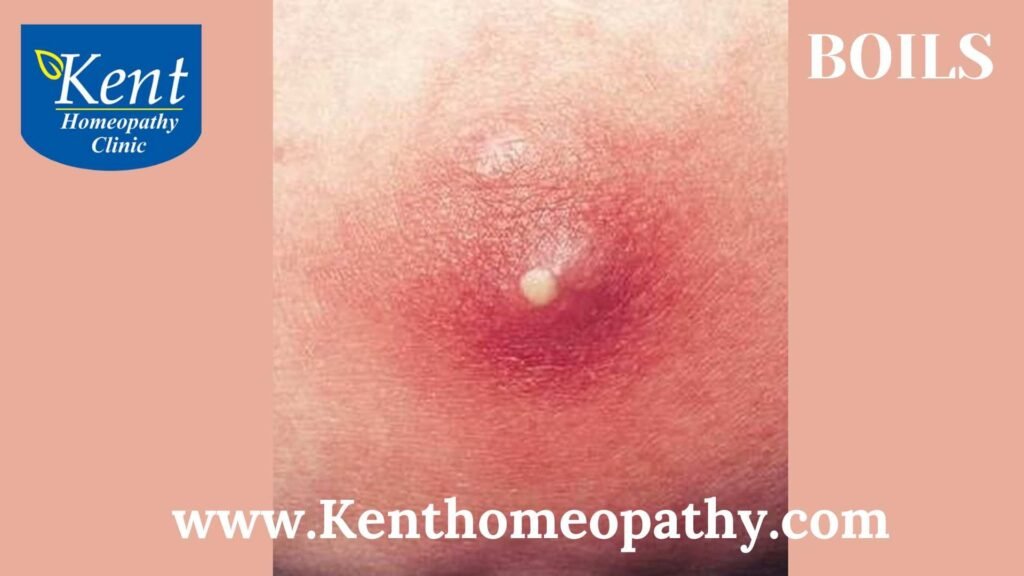Boils

Boils, also known as furuncles, are painful and often inflamed lumps that form on the skin. These skin infections arise from bacterial invasion of hair follicles or oil glands. Boils can be discomforting and may vary in size and severity, occurring either as isolated lesions or in clusters. Understanding the symptoms, causes, and types of boils is crucial for effective management and prevention.
Symptoms:
Boils typically present with distinctive symptoms that evolve as the infection progresses. Common symptoms include:
- Pain and Tenderness: Boils are characterized by localized pain and tenderness at the site of the infection. As the boil enlarges, the pain may intensify.
- Red, Swollen Bump: A noticeable red, swollen, and raised bump is a hallmark of a boil. The surrounding skin may also appear reddish.
- Pus Formation: Boils contain pus, which is a collection of dead white blood cells, bacteria, and tissue debris. The presence of pus gives the boil a yellow or whitish appearance at its center.
- Development of a Head: As a boil matures, it may develop a visible white or yellow head at the center. This indicates that the boil is ready to drain.
- Fever: In more severe cases, individuals with large boils may experience a low-grade fever.
- Spreading and Clustering: Boils can occur individually or cluster in specific areas such as the armpits, groin, buttocks, face, or neck. When boils cluster, they are known as carbuncles.
Causes:
The primary cause of boils is a bacterial infection, most commonly attributed to Staphylococcus aureus. Several factors contribute to the development of boils:
- Bacterial Infection: The entry of bacteria into hair follicles or oil glands, particularly Staphylococcus aureus, leads to infection and the formation of boils.
- Damaged Hair Follicles: Cuts, nicks, or other forms of damage to hair follicles create entry points for bacteria, increasing the likelihood of infection.
- Poor Hygiene: Inadequate personal hygiene can contribute to the accumulation of bacteria on the skin, raising the risk of boils.
- Close Contact: Skin-to-skin contact with an individual who has a boil or carries Staphylococcus aureus increases the risk of transmission.
- Compromised Immune System: Weakened immune systems, as seen in conditions like diabetes, HIV, or due to immunosuppressive medications, elevate susceptibility to bacterial infections, including boils.
- Friction or Irritation: Friction from tight clothing or repeated rubbing of the skin can irritate hair follicles, increasing the likelihood of boils.
- Poor Nutrition: Inadequate nutrition, especially deficiencies in vitamins and minerals, can compromise the immune system, heightening vulnerability to skin infections.
- Chronic Skin Conditions: Conditions like eczema or acne can compromise the skin barrier, making it easier for bacteria to enter and cause infection.
Types:
Boils come in different types, each with distinct characteristics:
- Furuncle: A furuncle is a single boil that develops around a hair follicle. It typically starts as a painful lump that enlarges, fills with pus, and eventually forms a visible head.
- Carbuncle: A carbuncle is a cluster of furuncles, often situated deeper in the skin. Carbuncles are larger and may cause more severe symptoms than individual furuncles.
- Pilonidal Cyst: This type of boil forms in the cleft of the buttocks, near the tailbone. Pilonidal cysts are often associated with ingrown hairs and can be recurrent.
- Hidradenitis Suppurativa: Hidradenitis suppurativa is a chronic skin condition characterized by the formation of multiple interconnected boils in areas with sweat glands, such as the armpits, groin, and buttocks.
Boils, while often uncomfortable and painful, are typically manageable with proper care and hygiene. Understanding the symptoms and causes of boils is essential for early detection and appropriate treatment. Maintaining good personal hygiene, avoiding skin trauma, and addressing any underlying health conditions are crucial steps in preventing the occurrence of boils.
It’s essential to note that individuals with weakened immune systems or chronic skin conditions may be more prone to recurrent boils and should work closely with healthcare providers to manage their condition effectively.
Contact to know more
Contact
Timings
Monday to Saturday:
11:00 AM to 02:30 PM
06:30 PM to 09:00 PM
